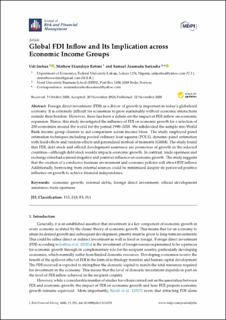Global FDI Inflow and Its Implication across Economic Income Groups
Peer reviewed, Journal article
Published version

Åpne
Permanent lenke
https://hdl.handle.net/11250/2727694Utgivelsesdato
2020Metadata
Vis full innførselSamlinger
Originalversjon
Joshua, U., Rotimi, M. E. & Sarkodie, S. A. (2020). Global FDI Inflow and Its Implication Across Economic Income Groups. Journal of Risk and Financial Management, 13(11): 291. doi: 10.3390/jrfm13110291Sammendrag
Foreign direct investment (FDI) as a driver of growth is important in today’s globalized economy. It is extremely difficult for economies to grow sustainably without economic interactions outside their borders. However, there has been a debate on the impact of FDI inflow on economic expansion. Hence, this study investigated the influence of FDI on economic growth for a selection of 200 economies around the world for the period 1990–2018. We subdivided the sample into World Bank income group clusters to aid comparison across income blocs. The study employed panel estimation techniques including pooled ordinary least squares (POLS), dynamic panel estimation with fixed-effects and random-effects and generalized method of moments (GMM). The study found that FDI, debt stock and official development assistance are promoters of growth in the selected countries—although debt stock weakly impacts economic growth. In contrast, trade openness and exchange rates had a mixed (negative and positive) influence on economic growth. The study suggests that the creation of a conducive business environment and economic policies will attract FDI inflows. Additionally, borrowing from external sources could be minimized despite its perceived positive influence on growth to achieve financial independence.
